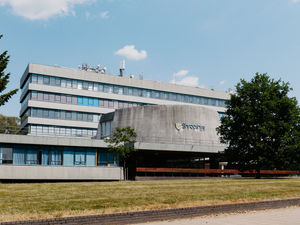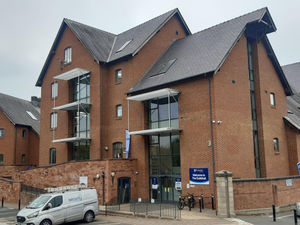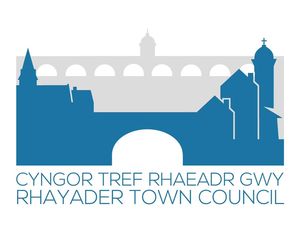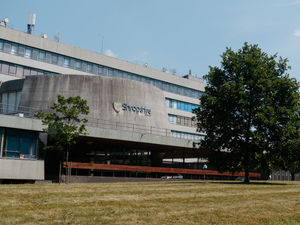When the Northern Ireland peace process came to Weston Park
"Put aside your anger, Evil thoughts of pain; Accept all forgiveness, Comrades again."
Shropshire schoolgirl Becci Garbett spoke for millions on both sides of the Irish Sea when she penned a poem that was read by political leaders including Tony Blair and Irish premier Bertie Ahern during crunch talks at Weston Park aimed at bringing peace to Northern Ireland.
The talks, which ended 16 years ago today, finished in deadlock, although there is little doubt they played a crucial role in the progress which has been made in bringing normality to Northern Ireland in the years that followed.
The summit at the Earl of Bradford's ancestral home at Weston-under-Lizard, near Shifnal, attracted considerable publicity when it was announced the week before. As well as the two prime ministers, John Reid, the Northern Ireland secretary at the time, leader of the Ulster Unionist Party David Trimble and Sinn Fein president Gerry Adams were also at the conference, and US President Bill Clinton was reportedly on standby to intervene if it was felt it would help the proceedings.
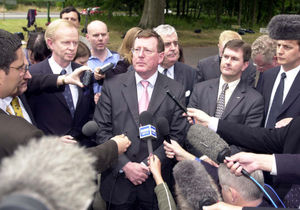
Yet when the talks actually did take place, the actual substance of them was largely unknown, the result of a media blackout which prevented even Mr Blair and Mr Ahern from revealing what the specific aims behind them were. There were daily press briefings from the PM, although he did not divulge much about what was being said.
Officially, the summit was scheduled for two days, although in reality the main delegates arrived on July 9 and the talks did not conclude until July 14.
Becci, 14, who was a pupil at Thomas Telford School in Telford, decided to play her part by sending her poem entitled The Price of Peace to the delegates at the conference.
It was not the first time Weston Park had hosted such a major event.
Colin Sweeney, chief executive of the Weston Park Foundation, says: "We had held the G8 retreat in 1998, so the Government was well aware of Weston Park.
"They wanted somewhere that was very secluded and very quiet, and it had worked well for the G8."
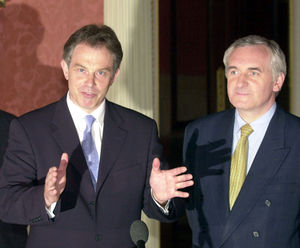
Organising an event of this size at short notice was no mean feat, but Mr Sweeney says the staff were well drilled in handling such tasks.
"It was certainly up there with the biggest events we have handled in terms of the level of security, we had both prime ministers there for the week," he recalls.
"John Reid, the Northern Ireland secretary, was technically the host, and we had the Irish ambassador their too."
He says the team was very well versed in catering for prestige events, and the biggest challenge was in working around the sometimes lengthy discussions and sudden changes to the programme.
"The talks were sometimes very long, they would go on for several hours, and everything we were dealing with was approximate," says Mr Sweeney.
"We had an approximate time for dinner, but that could be put back at very short notice."
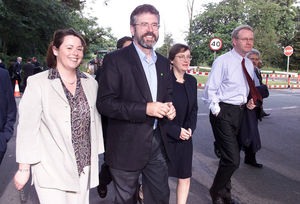
The talks had been triggered by the shock resignation of Mr Trimble as First Minister in the devolved Northern Ireland Assembly. The assembly had been created by the Good Friday Agreement, signed at Stormont in April 1998, which also created new institutions which were administered jointly on both sides of the Irish border.
But the agreement also laid out a timetable for the decommissioning of arms and the withdrawal of British troops from the streets of the province, and it was these measures which seemed to be the cause of the friction. Mr Trimble, leader of the Ulster Unionist Party, which at the time was seen as the more moderate of the two main unionist parties in Northern Ireland, resigned in protest at the IRA's failure to give up its weapons.
As Mr Blair prepared for the talks, he called on both sides to reach a consensus on the disputed areas of IRA disarmament, the scaling down of British army security measures, and reform of policing in the province.
"We need to sit down, get the hard work done and get this sorted," he said.
But the noises coming from both camps did not indicate this was going to be easy to achieve.
Mr Trimble said after his resignation: "We are going to have fresh political talks up until the end of July. If the IRA does not come up with something substantial I confidently predict the assembly and the institutions of the agreement will be suspended.
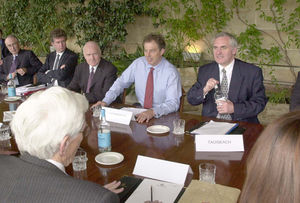
"The British Government has no other choice. And then we have a month off in August and we are back at the negotiating table for new talks in September. Does anyone else want to take over my job and negotiate with the same people we've been dealing with? I don't think so." Mr Trimble conceded that in the short term there was little evidence that the IRA was ready to seal arms bunkers with concrete or destroy weapons.
"So far the blame has been placed on Sinn Fein and I think it will stay that way now that I've resigned," he said.
Some of Mr Trimble's concerns appeared to result from a report from General Sir John de Chastelain, who was tasked with overseeing the destruction of terrorist arms. The report was "very bleak", said Mr Trimble.
On the republican side, Mr Adams accused Mr Trimble and the unionists of a "kamikaze" approach to politics, and did not sound as if he was in the mooed to make many concessions about the decommissioning of IRA arms.
'If the whole process is going to be predicated upon the issue of weapons when weapons aren't the problem, then the whole process I think becomes counter-productive," he said.
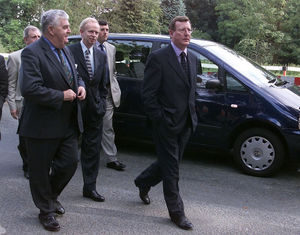
He also dismissed the prospect of Sinn Fein making any symbolic concessions to get the peace process moving again.
"It is not possible. It is not within our gift and it is not the responsibility of Sinn Fein to deliver to Unionists."
To add to the tensions, Mr Ahern and the Irish government was reported to be furious after receiving intelligence that the IRA had been involved in a multi-million pound robbery in the Republic of Ireland the month before.
Mr Ahern was reported to have questioned Sinn Fein's chief negotiator, Martin McGuinness, on whether the IRA was behind the theft of £4million cigarettes at Belfast docks just 24 hours after the party won four Westminster seats in the May 2001 General Election.
Given the high stakes involved, it was perhaps not surprising that the first day ended with the future of the Good Friday Agreement still hanging in the balance.
Mr Blair said at the end of the day's talks: "I hope very much when people have time to reflect on the discussions we have had they come back on Friday and settled down and do the last bit of hard discussion in order to ensure that we get the outcome we all want – stability, a decent future for the people of Northern Ireland, a decent future based on principles of democracy and co-existence between all members of the community."
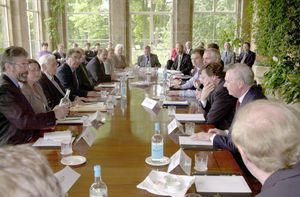
The talks came to an end on July 14, with no agreement reached, although a rescue package was drawn up at Weston Park which was presented to all the parties on August 1.
It centred on policing, normalisation of the security presence in Northern Ireland, the stability of the new Northern Ireland institutions and the decommissioning of terrorist weapons.
But no agreement was reached by deadline of August 12, and Northern Ireland secretary Mr Reid temporarily suspended the assembly and imposed direct rule from London.
The devolved assembly was restored in November after Sinn Fein encouraged IRA decommissioning and Mr Trimble was re-elected as first minister.
Decommissioning arms continued to be a stumbling block in the peace process until September 2005, when it was confirmed the IRA had put all its weapons beyond use, and the past 12 years have seen Northern Ireland return to a state of normality. A state of affairs which almost certainly owes something to that three-day summit at Weston Park 16 years ago.
Assembly on the brink once again
Sixteen years after the talks at Weston Park, Northern Ireland’s devolved assembly once more stands on the brink following a deadlock between the republican and unionist parties.
But it is a testament to how the political landscape has changed that it is issues such as green energy policy and gay marriage that are dividing the politicians today, rather than the decommissioning of weapons. The Northern Ireland Assembly, based at Stormont in East Belfast, has not met since January, and there seems to be little sign of the stalemate being broken anytime soon, with either a return to direct rule from London, or a third set of elections since May last year, the most likely of outcomes. And just as it was in 2001, the present crisis was sparked by a ministerial resignation, although this time it came from the republican rather than the unionist side, as was the case 16 years ago.
The late Martin McGuinness, who had served as deputy first minister in a power sharing arrangement between Sinn Fein and the Democratic Unionist Party, quit his post in January, ostensibly in protest of First Minister Arlene Foster’s role in a controversial green energy scheme.
The constitution of the assembly requires that it must be governed by a coalition of unionist and republican parties, and Mr McGuinness’s resignation also led to Mrs Foster losing her post.
Sinn Fein refused to nominate a successor to Mr McGuinness unless Mrs Foster stood aside while an inquiry into the Renewable Heat Incentive scheme, which saw an estimated £500 million of public money being wasted due to loopholes in the programme. The failure of the two largest parties in Northern Ireland, the Democratic Unionist Party and Sinn Fein, to come to an agreement led to Northern Ireland Secretary James Brokenshire calling for fresh elections, which were held on March 2, just 10 months after the previous ones.
However, it intensified the deadlock leaving the DUP with 28 seats and Sinn Fein on 27.
The DUP’s deal to support the Tory administration at Westminster has further strained the relationship. It’s a major blow to progress over the past 10 years.


